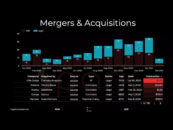How can companies ensure that they make responsible, reasoned, and transparent use of artificial intelligence?
At a time when the European Union is legislating to provide a better framework for AI, Ethos has published its third study on the digital responsibility of the largest companies listed on the Swiss stock exchange.
While progress has been made over the past three years, the study also shows that most companies are still not very transparent about their policies in this area and are not very well-prepared to deal with the many issues linked to their digital responsibility.
Generative AI, autonomous cars, surveillance, and facial recognition: artificial intelligence (AI) was at the heart of the news in 2023. While the European Union has just agreed on an unprecedented legislation at global level to regulate its use, Ethos is publishing its third consecutive yearly study on the digital responsibility of the largest listed companies in Switzerland.
How do companies ensure responsible use of AI? What policies are they putting in place to combat data leakage? What measures are they taking to reduce the environmental and social footprint of the technologies they use? Conducted in collaboration with EthicsGrade, this study examines companies’ practices in seven digital-related areas: governance, transparency, data protection, AI, sensitive activities, and social and environmental impact.
The 50 largest companies listed in Switzerland (SMI Expanded) were given three months to answer around 100 questions. At the same time, the same questionnaire was completed for each company based on publicly available information (websites, annual reports, sustainability reports, codes of conduct, etc.).
A growing number of good examples
The main finding of this third study is that the results are once again on the rise. All the companies have seen their score improve from one year to the next, proof that the dialogue and awareness-raising efforts undertaken by the Ethos Foundation since 2020 are bearing fruit. The average score rose from 22.8 points (out of 100) in 2022 to 27.5 points this year, with a maximum of 91.3 points for Swisscom. It was only 10.5 points in 2021, with a maximum of 39.6 points for Baloise. In all, eight companies scored more than 50 points in 2023, whereas only three had exceeded 20 points in the first study.
Perhaps even more encouraging, the results based on public information alone, which reflect the level of transparency of companies, are also up. The average is 15.6 points in 2023, compared with 11.2 points in 2022 and 8.5 points in 2021. The best result, again obtained by Swisscom, is 40 points, compared with 28.3 points in 2022 and just 18 points in the first study (Adecco). In 2023, 12 companies obtained a score based on public information of more than 20 points.
Among the most significant improvements is the fact that 39 of the 50 companies analysed now not only have a cybersecurity strategy in place, but also publish information on the subject. This corresponds to an increase of 25 companies since 2021. Or the fact that at least 40 companies have measures in place to reduce the environmental impact of the digital technologies they use, compared with just eight in 2021. Two companies (Georg Fischer and Baloise) have not only adopted a digital responsibility code but have also published it. In so doing, they met one of Ethos’ key expectations.
While this transparency does not guarantee that companies will behave beyond reproach, it is nonetheless essential. Not only does it engage the responsibility of management and enable any inconsistencies between public commitments and actual actions to be detected, but it also enables Ethos to draw on concrete examples – both good and bad – when advocating best practice to all companies.
A widening gap between the best and worst performers

Vincent Kaufmann
“Although undeniable progress has been made over the past three years, there is still a great deal of room for improvement,”
stresses Vincent Kaufmann, CEO of the Ethos Foundation.
“In particular, Swiss companies are still very reluctant to communicate publicly on issues as important as data protection and AI. It is also regrettable that Nestlé, Novartis and Roche, the three largest stock market capitalisations in Switzerland, persist in not participating voluntarily in the Ethos survey, despite the importance of these issues, particularly in their sectors of activity”.
What is perhaps most worrying is the widening gap between those companies that seem to have grasped the scale of the issues and the importance of demonstrating a degree of transparency towards them and the others.
Nearly half of the companies targeted by this study obtained a final score of less than 20 points. Among the most worrying points is the fact that only eight companies in the SMI Expanded, five more than in 2021, have adopted or claim to have adopted ethical principles relating to the use of AI. Or the fact that only eight companies claim to have a working group that focuses on issues related to ethics in AI, only one of which has public training on the subject.
Featured image credit: edited from freepik









